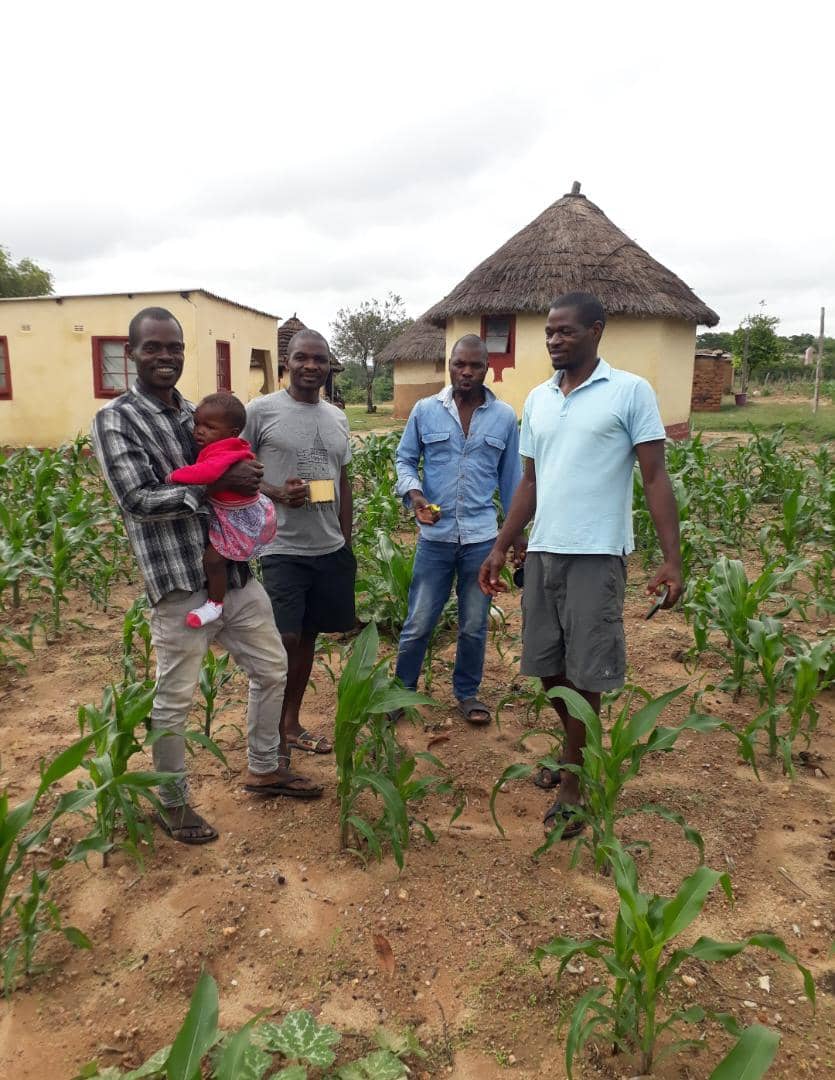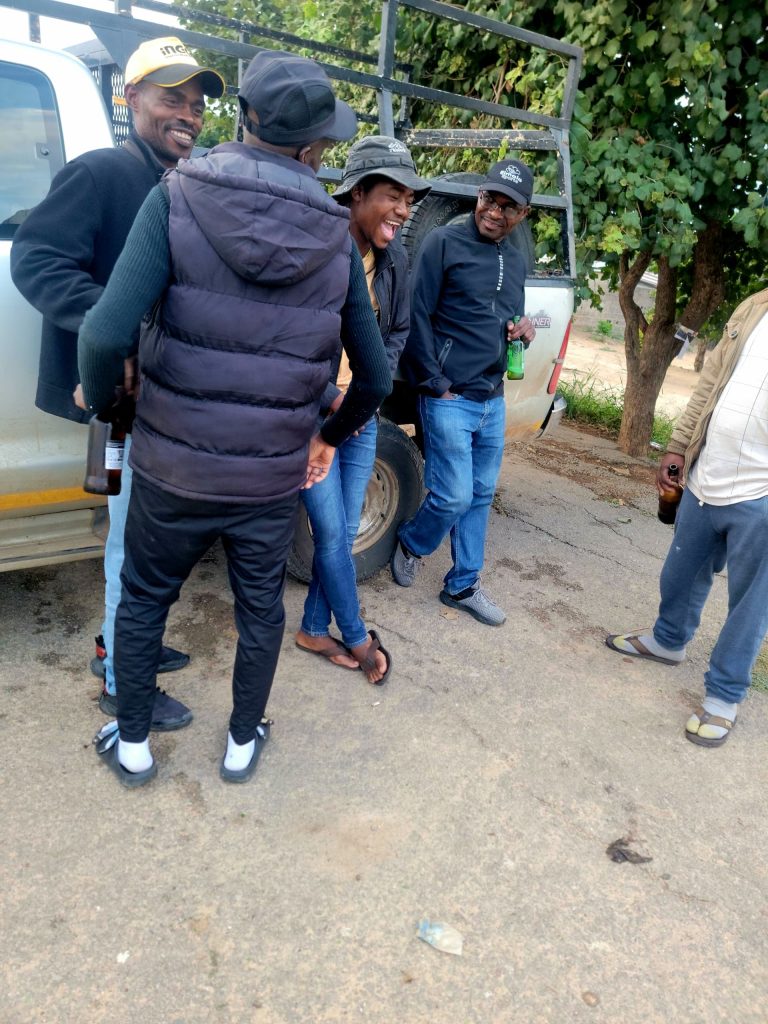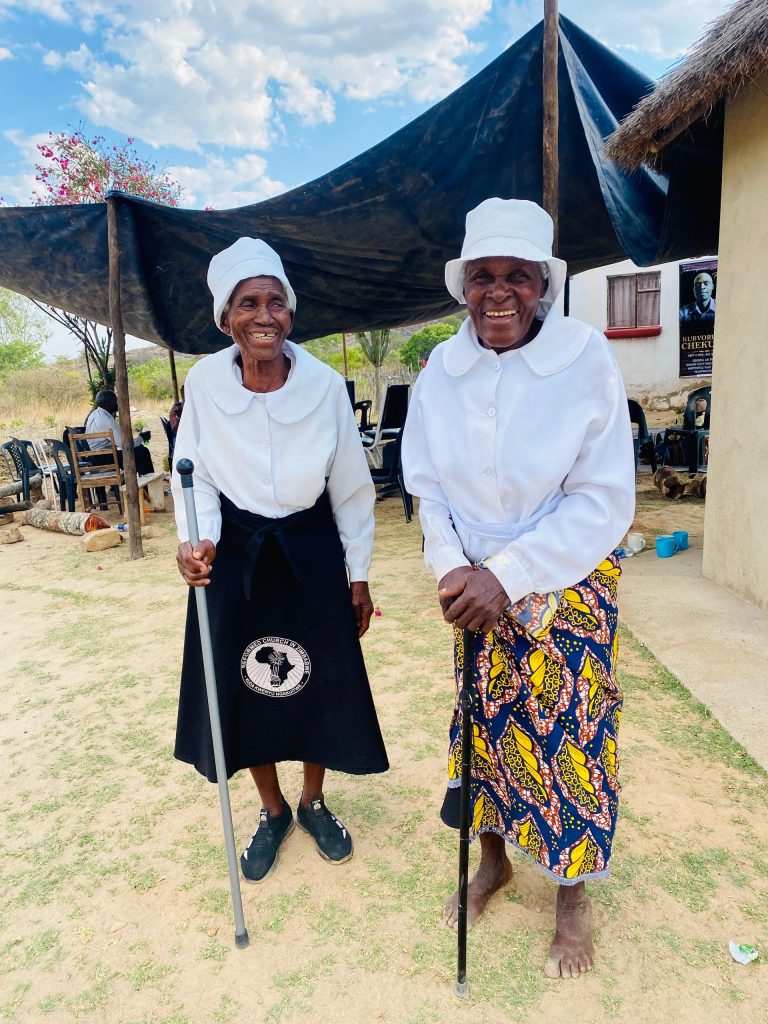
Mother Poem – Kubvoruno Chekure (1978-2025)
As Sabhuku Chekure’s wife, Grandmother hosted mass mobilization guerrilla meetings known as Pungwe. At Dick Rennie’s farm in Chiwara – possibly the vastly diverting inspiration for a South African landscape painter by the same name – Sabhuku Chekure had been forced down a pit where soldiers took turns to jump on him. And now his young wife and son faced the firing squad.
By Mukoma Onai/ September 2, 2025
Pano pane zvirango, ndezve paukama.
Kapfuko kari pano ndeke zvirango
"Pamusoroi", Oliver Mtukudzi (1978)
His name, Kubvoruno Chekure, is doubly translated: Alien. And his Mwenyi totem means nothing less. The clan made various trading stops from the Horn of Africa but it was their fine arts and spiritual offices that commended them to early Karanga kings. Their descent from the philosophical work couple, Solomon and Makeda, is teased in red-lettered scripture (Matthew 11: 42; 1 Kings 10: 1-13) and genetically tested against ancient Israel (Parfitt & Erogova, 2006; Tamarkin, 2020). Down in Madzimbahwe, the Jews of Africa are known as Vamwenyi (Migrants), Vashavi (Fortune Hunters) and Webanga (Knife Men), just as they are still circumcised to kosher ways of the ancient Hebrews. Other clan names, Musoni (Tailor) and Varemba (Walking Hangers), refer to the textiles, beads and other runner articles that hung (kurembera) from their shoulders in the olden times.
Six generations ago, the nomadic pauper-princes were leaving Chiwara in search of greener parts. “Peculiar travel suggestions” were, after all, “dancing lessons from God” among these people. But the Duma Chief had one objection or, rather, condition for their departure. If Chekure was leaving, he would do well to return Mukunda waMambo, the senior wife of the travelling party who also happened to be a Princess and Spirit Medium of the Duma. Hungayana, the baby who returned on her back was lost to his kin forever. While she saw to the rain-making offices, he grew up to dash across Mungezi River with a taunting call, and roll down boulders on invading impis. But he had to find the spirit of his fathers and start a clan on the goatskin of his mother. A stranger of foreign totem, Mother is, at the same time, Supreme, as Chinua Achebe teaches us. “A man belongs to his fatherland when things are good and life is sweet,” Uncle Obiereka tells Okonkwo in “Things Fall Apart.” “But when there is sorrow and bitterness he finds refuge in his motherland. Your mother is there to protect you. She is buried there. And that is why we say that mother is supreme.”
What is most human about Man, his inheritance of language, never agrees with the totem he answers to because it is a Mother Tongue, that is, the Tongue of the Other. Lovemore Majaivana, who knows this more than any living artist, erases his vocals and the lead instrument from his final song ever, only for his “Mother” Albert Nyathi to condemn him as a stranger from his own language:
Ungazi kwenze kuhle kanjani,
Uhlabele njenge Nyoni yeZulu,
Ugide njenge gide lendlini,
Ugiye njenge qhawe likaMzilikazi,
Abala ndaba lawe,
Uyi mzukulu nje kuphela
Umuntu wokuza.
(Carry yourself with class all you may,
Sing like the Lightning Bird,
Dance like the dancer of the house,
Dance like a warrior of Mzilikazi,
They don't care about you,
You are just a nephew,
An adopted person)
"Isono Sami Remix", Lovemore Majaivana (2000)
This was Hungayana among the Duma, his “Mothers.” If I dare not name the Ancestors that followed, it is not merely because I am the adopted person in the smoky hut of this Mother Poem. It is because my Mother’s kin, the Jews of Africa, are the living heirs of negative theology. Their dual totem, Mouse (Mbeva) and Elephant (Zhou), agrees with the self-alienating – if not boat riddle – logic of Majaivana’s totem: The Lightning Bird (Inyoni yeZulu) that strikes the Metal (Golide); the Sheep (Wayi) that fights the Lightning; the Hyena (Impisi) that devours the Sheep; the Mafavuke (Resurrection Bush) whose holy virtue drives back the Hyena, starting over a cycle of regeneration.
Everyone grows up to discover Mavingu – fertility tropes of the totem poem. But Magombe – famine tropes – are the founding mythos nobody talks about. Herbert Chitepo’s line, “Tibvesu tine upandeure; vanosara vachidya uparire” (Let us, castaways, make room for the prosperous) from the great Shona epic, “Soko Risina Musoro” (1983), fortuitously accords with the place of negation in the totem poem. The totem poem is an empty string structured like negative theology, if not game theory, cryptography or, better yet, zero-knowledge proof. It must be repeated for many a rite of passage: birth, marriage, chieftaincy and honoring the ancestors. And yet it must hide what is most essential about it in plain sight.
My Ancestors carried on Hungayana’s legacy of alienation with names like Soul Militant, Earthbender and the Bad Ones. The self-reproaching pattern of these names was not so much humility as it was memory. In the very moment of his Fall, man’s founding gesture is separating his consciousness from his vital practice (Genesis 3: 22).
In the long night and yodelling ring of the mbira gourds and pure chimera calabashes, of bare feet by the fireside, and nheketerwa and zvirwa zvenyika, the elder whispers our words to the ancestors because:
Nyaya hadzitaurwe mune vamwe vatereri,
Vanotora mazwi vachitapa nhau,
Mbudzi haivhiirwe mune vamwe vatereri.
Vanotora mafuta vozora maoko
"Shumba", Thomas Mapfumo (1980)
But this is a guardrail of domestic remit. A totem belongs out there, with other animals of prey. It is what decides the houses of maids and kings. It’s secret must be encrypted into what is chanted in public. And so Bhebhe is “Bwana bwoMurozvi bwaitsva muchoto (sickly Rozvi child of the Rozvi who burned in the fire); Gumbo are those eating chiefs “vanodyira pazhe nokutya vaera Shiri” (who eat outside in fear of the Hungwe); Humba is “Rima” (Darkness); Matemai is “Mutiwaora” (Rotten Tree) and “Musiyiwa” (The Abandoned); Moyo is separated by famine tropes into different clans of “Mushoriwa” (The Despised), “Risingakohwe” (He Who Does Not Jarvest), “Mudadirwa” (The Segregated”, “Nyakuvengwa” (The Hated) and “VaRozvi vakapera nenda” “The Rozvi who were eaten by faggots.”
And so Bhebhe is “Bwana bwoMurozvi bwaitsva muchoto (sickly Rozvi child of the Rozvi who burned in the fire); Gumbo are those eating chiefs “vanodyira pazhe nokutya vaera Shiri” (who eat outside in fear of the Hungwe); Humba is “Rima” (Darkness); Matemai is “Mutiwaora” (Rotten Tree) and “Musiyiwa” (The Abandoned); Moyo is separated by famine tropes into different clans of “Mushoriwa” (The Despised), “Risingakohwe” (He Who Does Not Jarvest), “Mudadirwa” (The Segregated”, “Nyakuvengwa” (The Hated) and “VaRozvi vakapera nenda” “The Rozvi who were eaten by faggots.”
And so there was Kubvoruno Chekure: a double alienation, double negation, denegation, anti-name, anti-concept; différance that the great African Jewish philosopher Jacques Derrida would have understood too well.

“We had become – indeed, we are – the Jews of Africa, and nobody wanted us,” Dambudzo Marechera writes about the alienation of black Rhodesians among fellow black exiles in the U.K. This double alienation also hints at Derridian différance: a kind of difference that can never be positively identified because what it differs from is infinitely deferred along a chain of differences. While Mavingu provoke (kuvingudza) fertility and domination in the name of the totem animal, Magombe separate (kugombedza) it from its vital practice for the purposes of world-building. Famines, lost kingdoms, loneliness, death and ruin punctuate Magombe where power, population and plenty punctuate Mavingu.
And so my first memory of Sekuru Kubvo, who died in the early hours of August 30, 2025, equally features a Duma princess dicing with death with a baby on her back. The year was 1979. He was strapped to his mother’s back while he she was herself circled by Rhodesian soldiers. As Sabhuku Chekure’s wife, Grandmother hosted mass mobilization guerrilla meetings known as Pungwe. At Dick Rennie’s farm in Chiwara – possibly the vastly diverting inspiration for a South African landscape painter by the same name – Sabhuku Chekure had been forced down a pit where soldiers took turns to jump on him. And now his young wife and son faced the firing squad. War was bad for Mao’s fish, as much as it was for the water. Sabhuku Chekure carried his infirmity to his dying days. Mother dropped out in Grade 7 for related reasons. The soldiers would have killed Grandmother but she pleaded, “Mirai ndiburuse mwana wangu mozondiuraya.” She – or rather they – were beaten around. But the Ancestors prevailed. Mother and Son lived to see another country.
In Zimbabwe, Sekuru Kubvo was a journeyman with a never-ending journey. His totem was Mushavi (Hustler) after all. The Varemba (Walking Hangers) so-called because they dangled the finest articles in town all the way from the Horn of Africa. It is they who brought the famous Ngomarungundu to Zimbabwe, a replica of the Davidic Ark smuggled by the Levites to Ethiopia after the divided kingdom fell into dark ages. Varemba were Hustler Priests, tasked with the spiritual offices of fighting Karanga chiefs. Sekuru Kubvo carried on the legacy of hard work everywhere he heard work calling. Botswana muragas, South African trucks, lithium shafts at Bikita Minerals, Bulawayo factories, Kwekwe gold rush, Riverton Academy. His last shift at the abattoir allowed CSC to sell locally prepared kosher, or halal, seeing as Sekuru Kubvo was a black Jew of that great Lemba tribe.

At 24, he had his fair share of hustling blunders. Having paid dearly for a few bags of roundnuts to sell for his train ticket to Botswana, he decided the lousy sacks were not his style and exchanged them for totemic stone carvings from Muzokomba Growth Point. A Lemba hallmark, throwing high-end cultural appetites into the hustle. Next time we saw him drunk on well-earned elixirs at the end of 2003, “dumelang” and “kusiyani” had not quite washed off his demeanor.
I stayed with Sekuru Baba Jane when I first came to Bulawayo. I had to brush off my provincial look before college. Sort of the city arrivant who would turn up at Maureen Court and ask what subjects were required for one to train as a magistrate. When he had time, he accompanied me on better-informed pursuits. I never got a job until he recruited me as his dhakaboy and we plastered durawalls in Tshabalala, the street across one Vulindlela Shop, for my college wardrobe.
His first name, Kubvoruno, was the family man. He literally dragged me along and told me to interview his namesake, Bambo or VaKay, himself on the eve of dementia, for family history. I was already sufficiently awkward, heir to a forgotten family literary tradition, arriving too late to convince anyone that there was anything in it. But posing with a voice recorder at a funeral was prime awkward. The Old One told me about Munhundowarwa, Rambanapasi, world-building scions of the black Jewish stock. Sekuru Edward, Sekuru Pride and Sekuru Violin may write these stories one day.
I was not too careful with the assignment. Resident in the village this year, nevertheless, I was able to sit down to mahewu and nyimo at a nhimbe, though, and interview Mama Chengeto and Sekuru Patson about one of my great ancestors, Janfeck Chekure (1957-1980). Sekuru Jani is the author of “Rudo Ndimashingise” (1979), a recurring setbook now out of print, and “Mvengemvenge”, potentially the first short story collection in Shona by a single author, and still one of the very few texts in this form. It was posthumously published in the early 80s with a preface by the People’s Poet, Chenjerai Hove.
One of the highlights of every holiday was tagging along Sekuru Kubvo’s tape recorder sessions. In 2001, our most repeated cassettes were “Kumera kweZora”, “The Very Best of Simon Chimbetu”, “Chimurenga Unlimited” and “Mashoko”, the lost tape where Madzibaba Zakaria lines up in a gonyet on the sleeve after the infamous split. The man was a Zhakata zealot. A mark of our generation gap is that I was a Macheso zealot at least by the Y2K pungwe, but I was also sufficiently on board with the great Zhakata-Chimbetu debates. This is what we had debated going home after infant classes. Zhakata’s “Mugove” was dubiously dominant years after release. He was the top man with Chopper’s last LP before 1991 imprisonment, “Karikoga”, as his middle name. The new Karikoga was still major going into the 2000s and crowned a classic run with Y2K gold but Chopper arguably dealt him back back-to-back with “Survival” (1997) and “Lullaby” (2000).
Sekuru Kubvo was never able to separate himself from popular culture in order to perform it. It was all baked into his vital practice. Martin Heidegger is called the philosopher with a hammer because he understood that a philosopher does not separate himself from the lived theater to passively contemplate being. Kule KB was equally a philosopher with a hammer, caught up in the hard-hat business for better or worse. The idle hours were a hiatus between hard shifts. When there was no shift, everything was tinged with the lack. There was always the music. In 2011, it was ubiquitous MP3 era. The old school CDs. 80s-era nostalgia. I challenged Sekuru Kubvo for selling out to the Marxist Brothers. But it was no longer a 90s debate for him. Less so the live commentaries over early 2000 tapes. Music was now just an extension of hardships of the workingman. He loved his Mother desperately, his fellow Pungwe comrade. When she was ill back in Gutu, “Gata” played without end; and when foreign pastures served him well, he generously remembered her struggles.
He was the right back for Chinyekunye, social soccer outfit of his native Chekure in the late 90s and, boy, what a temper. He pounced on older men, I remember one unfortunate Muponda in 1997, with the ferocity of a flying dragon. Later, he would impatiently frown on ill-treatment at work with the Pengaudzoke memo, “Kurarama kwangu ndini ndinokuziva,” and leap into the mean streets for his next gig. Mostly, beer was not his thing. It was just the holy herb, initially with a split conscience so that he would phone me few neighborhoods away, “Stan, munyati uya ndakazousiya wena.” In time, it was all backed into the vital practice of a hard-driven journeyman.
When he was a boy, his sisters gave him a hard time for his love of better educated women. But if he was a philosopher with a hammer, it was not merely for the work ethic but for a depth of his own. Madame Raina, the Science Teacher, was the love of his life. He executed himself exemplarily in the offices of a husband. When I was staying with them in Nkulumane 5, he seemed less disappointed with his failure to strike the big time in Kwekwe mines, and merely lowdown disgusted with the bohemian ways of his comrdaes back at the pits. He could not put up for too long in the environment. Whether his blessings were elsewhere this side of the sun, it is for God to say, and a humbling day to remember that our time is loaned by the Author of Life.
feedback: mukomaonai@duck.com

You are a star hommie
Thank you very much, homela
I love this.thank you so much son.
Pleasure, Mama